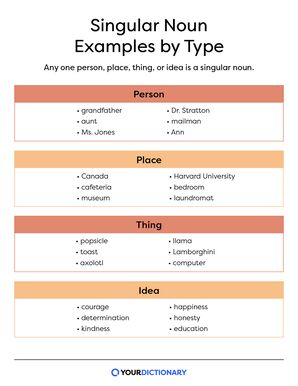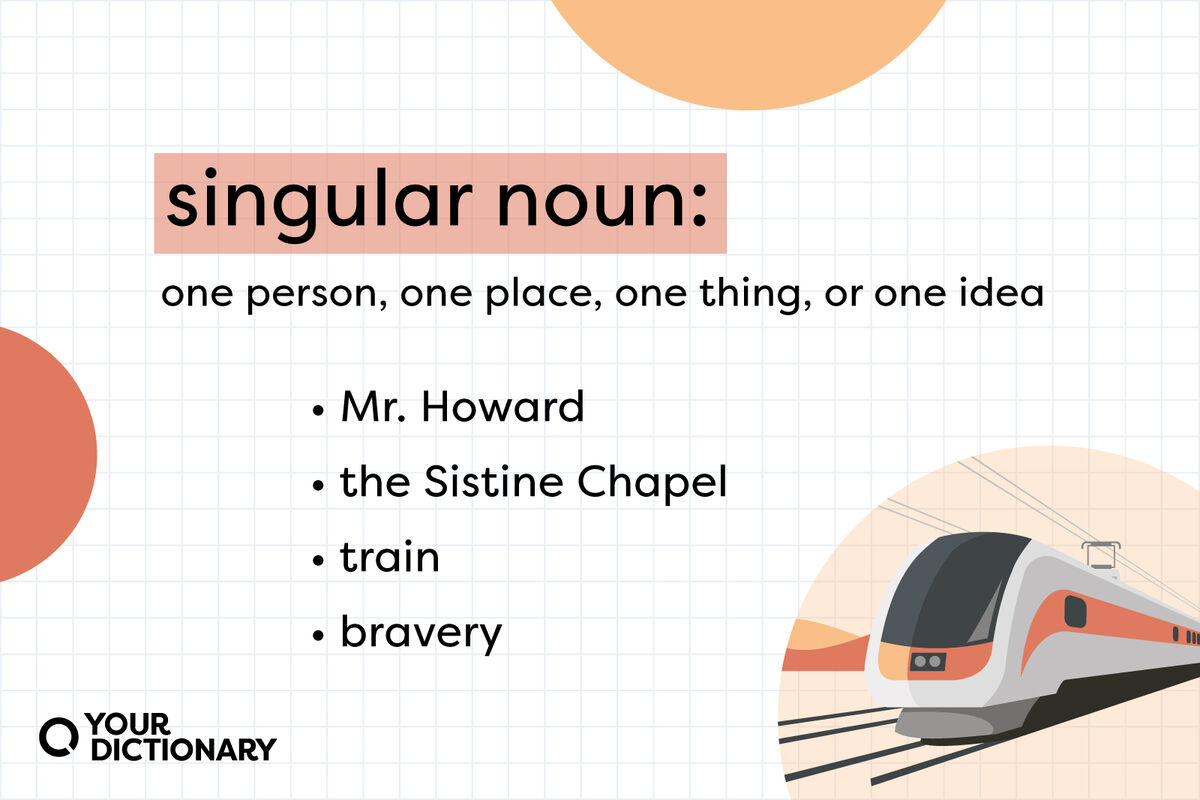

One soda, one sandwich, one piece of pie. What sounds like a lonely lunch is actually a list of singular nouns. In fact, when you have only one noun of any kind, it’s always a singular noun. But it’s not a singular noun’s loneliness that you need to worry about — it’s how to use it in a sentence.
What Is a Singular Noun?
A singular noun is one person, one place, one thing, or one idea. The word singular comes from the adjective single — only one of something.
Examples of singular nouns include:
- train
- puppy
- the Sistine Chapel
- eagle
- a Cadillac
- Mr. Howard
- creativity
- Eleanor Roosevelt
Using Singular Nouns With Singular Verbs
The role of singular nouns becomes more important when you’re using them with verbs. Singular nouns use singular verbs (known as subject-verb agreement) and singular determiners (a, an, one, the) to show their singular status.
- The motorcycle is really loud.
- A nurse lives next door.
- One dog barks all night.
- An elephant eats nearly 400 pounds of food every day.
Singular Nouns vs. Plural Nouns
When you’re talking about more than one noun, it’s a plural noun — and you need to use plural verbs instead.
Plural nouns use plural determiners (such as some, a few, many, and the — which works for both singular and plural nouns), or they can have a number higher than one as their determiner. But unlike singular nouns, plural nouns can stand without a determiner if needed.
- Motorcycles are really loud.
- Two nurses live next door.
- Some dogs bark all night.
- Most elephant eat nearly 400 pounds of food every day.
Printable List of Singular Nouns
Whether you are teaching about singular nouns or just need a refresher, this list of singular nouns works great as a poster or a reference page.

Examples of People as Singular Nouns
You can use singular nouns (both common and proper) to talk about one person.
- The firefighter arrived quickly.
- Ken wants to be a teacher when he grows up.
- How old is your sister?
- Please ask the police officer if we’re allowed to park here.
- Dr. Hudson will see you shortly.
Examples of Places as Singular Nouns
Whether you’re describing an everyday place or a faraway country, nouns that describe places can also be singular.
- We’ll arrive in Italy tomorrow afternoon.
- Paul doesn’t like going to the dentist’s office.
- What’s the best restaurant in town?
- I just want to go home.
- My daughter toured Yale University last week.
Examples of Things as Singular Nouns
If you’re talking about just one thing, treat it as a singular noun.
- Can you get a pizza for the kids?
- The cat has been meowing all day.
- Your sofa is really uncomfortable.
- I spilled paint all over my shirt.
- Who owns the Ferrari outside?
Examples of Ideas as Singular Nouns
Ideas, also known as abstract nouns, are often singular. Some can be plural (such as beliefs or principles), but for the most part, you’ll see ideas in singular form.
- College students value their independence.
- Gary’s shyness kept him from making new friends.
- The woman’s bravery saved the child from drowning.
- Compassion is an important trait for a teacher.
- I value honesty above all else.
What Types of Nouns Can Be Singular?
You already know that common nouns can be singular or plural, and that proper nouns are almost always singular (unless you’re talking about things). But what about the other types of nouns?
|
Noun Type |
Singular Form? |
Example |
|
Yes |
Raul’s car isn’t working. |
|
|
Rarely (only things, not people or places) |
I’d love to own a Cadillac someday. |
|
|
Yes, when referencing one group |
The team smiles for a picture. |
|
|
Yes, when there’s only one noun |
Can you hand me a cookie? |
|
|
Uncountable Noun |
Yes (no plural form) |
I spilled some milk. |
|
Yes (add apostrophe and “s”) |
My brother’s girlfriend is taller than I am. |
|
|
Yes, when there’s only one noun |
The cupcake tasted wonderful. |
|
|
Yes, if it’s uncountable |
There is love in our house. |
Use Singular Pronouns To Replace Singular Nouns
Tired of all these singular nouns? Feel free to swap them out with singular pronouns to keep your sentences from sounding repetitive. He/him, she/her, and the singular they/them can stand in for a person, while it stands in for places, things, and ideas.
- Peter wants to work here.
- He wants to work here.
- Did you tell the customer where to park?
- Did you tell them where to park?
- Can I borrow the car?
- Can I borrow it?
Singular and Ready To Mingle
Now that you know your singular nouns from your plural nouns, it’s time to put them to the test in your writing. Learn how to use noun phrases within a sentence — and if you’re ready, learn how gerunds fit into this singular situation.